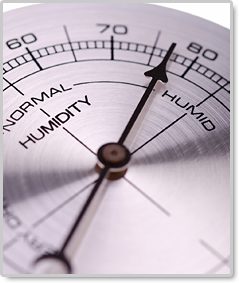Reducing Humidity in Your Home: Why & How-To

Benefits of Reducing Home Humidity
There are four main reasons for reducing the humidity of your home: 1) improved comfort; 2) reduced formation of mold and related pests; 3) reduced environment for dust mites; and 4) cost savings. Excessive humidity in your home is not only uncomfortable, but it can also cause moisture-related damage to your house, such as mold formation and pest infestations. Running your air conditioner will lower your home's humidity (in addition to lowering the temperature), but reducing the humidity in your home is a more economical way to feel more comfortable during the coming summer. And proactively reducing the humidity in your home is also more cost-effective than repairing the damage that's caused by high humidity levels (helpful accessory: humidity monitors).
Signs of Excess Humidity
Indications that the high humidity levels in your home include: mold formations in your bathrooms, closets, walls or ceilings; moisture on basement walls and floors; condensation, frost, or ice on the inside surface of windows; damp spots on ceilings or inner surfaces of exterior walls; and ice or frost on the underside of the roof sheathing in your attic space. If you don't already have one, you should consider getting a hygrometer, which will allow you to measure the humidity levels at various places around your home. You should target to keep the relative humidity levels in your home below 60% in the summer. And if you're concerned about dust mites, then you should target to keep humidity levels less than 50%.
Steps You Can Take
Reducing humidity levels during the summer in your home can be thought of in three ways: 1) keeping water out; 2) creating less moisture in your home; and 3) removing the moisture from inside your home.
Examples of these include:
-
Checking your attic for indications of water leakage through your roof.
-
Ensuring that your attic crawl spaces have adequate ventilation.
-
Using exhaust fans in your bathrooms and kitchens to remove moisture before it spreads throughout your house; however do not run any longer than needed since blowing air out of your home will cause additional humid air to be drawn inside your home (see types, costs, and reviews of exhaust fans).
-
Ensuring that your roof gutters and downspouts channel water away from your foundations.
-
Avoiding overwatering shrubs and plantings near your home, and making sure that your lawn sprinklers aren’t aimed at your house.
-
If your home has high humidity in just one area such as a basement or unscented storage area, then you may want to consider getting a dehumidifier for that area (see types, costs, and reviews of dehumidifiers).
-
And if you live in a region of the country that is humid all year round, you might want to consider adding the types of houseplants in your home that actually absorbed humidity from the air such as: Peace Lily; Reed Palm; English Ivy; Boston Fern; or Tillandsia.
Related Articles . . .
Protecting Your Family From Mold
Keeping your home free of mold requires: prevention; quick action; and sometimes the help of a trained professional. Here are some suggestions for preventing and managing mold around your home.
Energy Efficient Way to Better Indoor Air Quality
Air quality inside a home is typically 5 times worse than outdoor air quality. This article describes how Indoor Air Exchangers can give your home fresh outdoor air without losing heating or cooling energy.
Air Registers: Better Air Quality & Saving Energy
If you have air registers in your home for either air conditioning or heating, then this article will help you save money on energy, and will help you ensure healthy air quality for your family.
14 Ways to Keep Cool AND Save Energy This Summer
Want to keep cool this summer and save money on your air conditioning bills? Here are 14 helpful tips. Some of these tips don't even cost any money!
Getting Rid of Winter Dryness
During the wintertime, the relative humidity in your home can drop below 15% causing a variety of health, comfort and woodwork problems for your home. This article gives helpful ideas for increasing the humidity in your home.
Creative Ways for Increasing Home Humidity
Dry air in your home during the winter can cause problems affecting your family's health and comfort, and can damage your home's expensive woodwork. This article gives you some creative options for increasing the humidity in your home.










